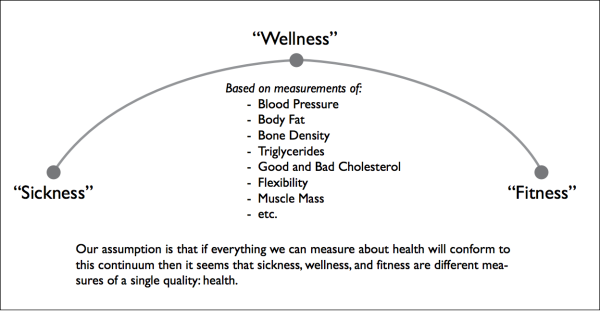As you approach the new year and consider course corrections, you might find yourself rethinking your health and fitness goals. While most of us share the common thread of being physically active, what we don’t often realize is the impact our behaviors have on our overall wellness during the other 23 hours of the day. Unfortunately, it can be difficult to navigate the murky sea of information pertaining to nutrition and lifestyle and even harder to decide what’s important to track when it comes to our health. Should you be concerned about your weight? Has your doctor made a remark about your BMI at a recent visit? Do you know how your body fat percentage compares to others that share your age and gender? And most importantly, does any of this even matter?
These are common questions with uncommon and, oftentimes, complex answers. Generally, we all want to be “healthy”, but few terms are as subjective. CrossFit’s founder, Greg Glassman, attempted to address this issue by developing a definition for “health” and “fitness” as part of the CrossFit Trainer’s curriculum. He covers this in a two part lecture that was originally posted on the CrossFit website in 2009. It is further illustrated in the following sickness-wellness-fitness continuum also included in the curriculum:

While this serves as a valuable framework, it is far from comprehensive when it comes to observing and measuring all of the elements that impact our health. Especially when you consider the intangibles such as stress, relationships, and other personal or environmental factors that influence how we feel each day.
When it comes to pursuing wellness, the most common pitfall is viewing improvements to our health in bite sized chunks in the form of “30-day challenges” or “7-minute abs”. It’s no secret that the diet and fitness industry takes advantage of our culture’s obsession with instant gratification by trying these arbitrary time frames to programs that seldom work and often result in relapse, or worse, send us into a post-diet binge followed by weight gain that surpasses our starting weight. It’s not so much that there is anything wrong with short-term goals, but when we view our health and wellness in this light, it sets us up for disappointment and abandonment after completing the latest fad diet or exercise plan.
If you think about what makes a program like CrossFit effective, it’s largely due to the fact that many of the workouts are set up to be repeatable. Your skills, strength, and neuromuscular pathways will evolve overtime, but “Fran” will always be a rep scheme of 21-15-9 of 95 lbs. thrusters and pull-ups. By offering these measuring sticks, there is a dependable and repeatable way to determine whether we’ve made progress. Habit formation is similar in the sense that there are often triggers tied to behavior that, when identified, can serve as measuring sticks for when we’ve successfully implemented and formed a new habit.
Some of you may recall communication earlier this year about the first Healthy Habits program that was offered at The Foundry. At the time, twenty brave souls embarked on a 90-day journey to make changes to their health in hopes of developing habits that would stay with them beyond the life of the program. To say that many of those individuals made significant progress would be an understatement. See what one of the participants had to say:
I decided to join healthy habits because I was ready to devote some time to learning how to eat right, cook better meals, and more importantly, take care of myself. I perform best when someone holds me accountable and I thought Healthy Habits provided that accountability and the support needed to be successful.I just turned 30 and everyone keeps asking “how do you feel about that?” My response is always the same, ” I feel great! I am in the best shape of my life.” 3 months was a huge transformation. I had loads more energy and maxed out all my lifts continuously. I lost a couple of pounds BUT more importantly lost 5% body fat. I felt much stronger, my mind was sharper, and I had enough energy to join and be successful in the Endurance program. I went from working out 3 times a week to working out 6 times a week and it was no big deal. Eating right was the key to recovery and getting stronger. Best progress I have ever seen in just 3 months!-Sam Siddiqui, Foundry Printer’s Row Athlete
If you’re nodding your head while you read through this and it clearly resonates with you, perhaps it’s time to ditch the age old New Year’s Resolutions and consider a long term approach.
Healthy Habits has been revised to provide more accountability, additional measures of success, and a significant amount of interaction with Coach Matt and other like-minded participants. If you’d like to check out the changes and learn more about how to achieve sustainable, long-term results including increased lean mass, lower body fat percentage, and increased energy head over to the program page for Healthy Habits 2.0.
Healthy Habits 2.0 Page


Trackbacks/Pingbacks